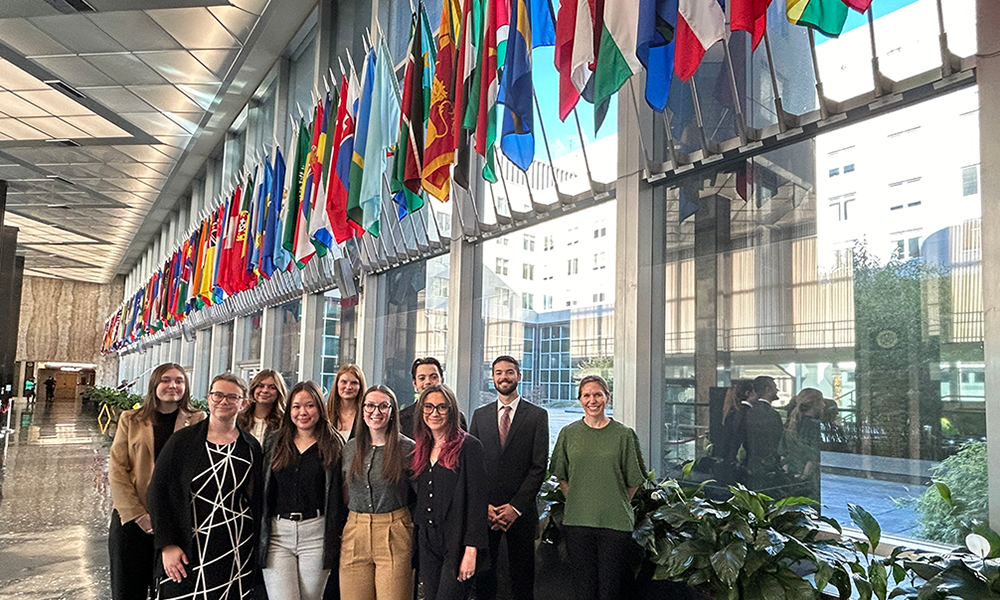From the classroom to the Department of State
News
SUMMARY: In a research capstone for the Global Religions and Cultures major, students worked hand in hand with the U.S. Department of State.
College capstones usually give students practical disciplinary experience in a low-risk environment, but for the students in Christina Kilby's Fall 2024 Buddhism in the Modern World course, the stakes were anything but low.
The course serves as a research capstone for the Global Religions and Cultures major, and this semester’s students worked hand-in-hand with the Diplomacy Lab to generate original research and present it to the U.S. Department of State (DOS). Launched back in 2013, the Diplomacy Lab is a “course to source” disciplinary research space that connects students and faculty around the country with the government, military, private sector and NGOs to collaborate on research used to tackle foreign policy issues.
JMU has worked with the Diplomacy Lab many times in the past, thanks to a partnership forged by Bernie Kaussler, Professor of Political Science and founder of our own CAL Diplomacy & Defense Lab. Funding from the college supported Kilby and her students to travel to Washington, D.C., to present their research at the Harry S. Truman Building, headquarters of the DOS. They toured the building, seeing the library and special collections and an exhibit of diplomatic gifts. After the event, they visited a Khmer Buddhist temple in Northern Virginia, where they met with the resident monk and two members of the Khmer community.
Kilby, a professor of religion at JMU, tasked her students with researching how to protect the civil and political liberties of Buddhist monks and nuns in Southeast Asia — Cambodia, Vietnam, Thailand, Myanmar — as they exercise environmental defense. Through case studies, students identified how Buddhist monastics have been repressed, displaced and robbed of their social identities — sometimes expelled from monasteries or even disrobed for their environmental activism. To most students, the subject was entirely new.
Also new was the workflow students developed, which made the classroom seem more like a professional space. The environment was different enough from the rhythms in academia that Kilby found herself learning alongside her students. The DOS works around the clock, so to communicate with clients and meet deadlines, students had to do the same. While challenging, working directly with clients and their busy schedules gave students practical experience in teamwork, collaboration and adaptability in the workplace.
“What made it such an invaluable experience for me is the fact that, throughout my undergraduate experience so far, most of the work has felt preparatory for a career as opposed to making an impact outside of JMU,” said Rory McDermott (‘26), a student from the course. “The Diplomacy Lab was different because it felt like we were working for something bigger than ourselves, something with a far reach beyond JMU, beyond Harrisonburg and beyond VA.”
Kilby and her students included substantial background on the subject in their presentation, expecting that most listeners would not be experts on Buddhism. They delivered the presentation live on November 21 to 50 DOS employees serving in a variety of roles on different continents. Attendees seemed to see the importance of religious actors in environmental defense in much wider cultural contexts, beyond Buddhism or Southeast Asia. A recording was then shared with embassy and consulate posts around the globe.
The students were regarded as having one of the best Diplomacy Lab presentations that the department has ever seen; one DOS employee said they were “as professional and polished as they come.” Luke Bush (‘24), another student from the course, remarked, “I think we were all surprised by how strong our presentation was and how quickly we had grown to be confident and knowledgeable of the difficult and vast content.”
Kilby says she never doubted that her students would excel. She attributes their success to their passion for the project, a willingness to take on the substantial workload, and a serendipitous affinity among the students, whose individual approaches and viewpoints blended in innovative ways.
As a teacher and scholar, Kilby appreciated having the freedom to try something new with the capstone; she hopes to teach a similar class in the future. She also encourages other faculty to take their classrooms off campus. “It is so important, now more than ever, to provide students with engaging learning experiences that allow them to collaborate with partners making a far-reaching impact in the real world.”
